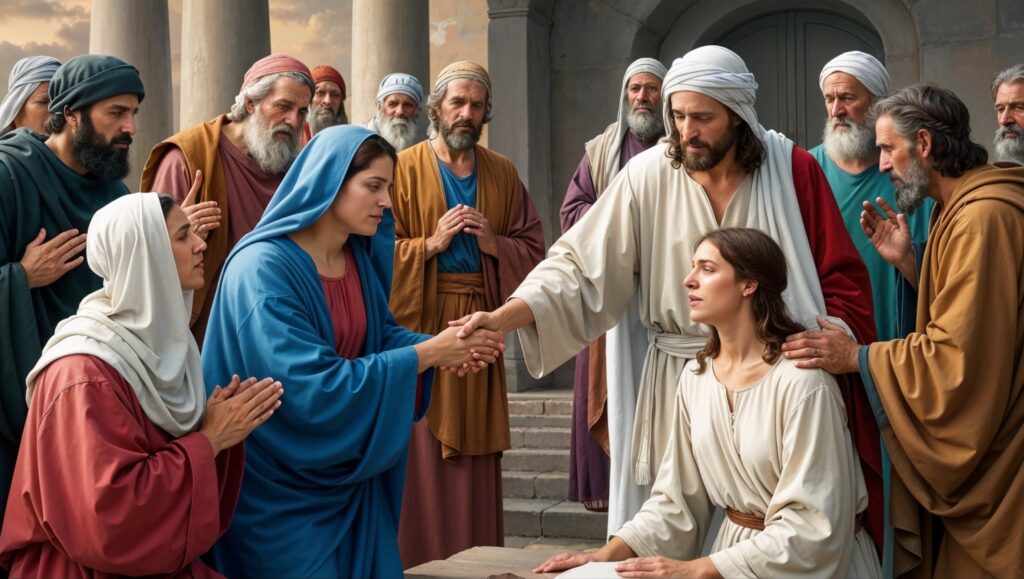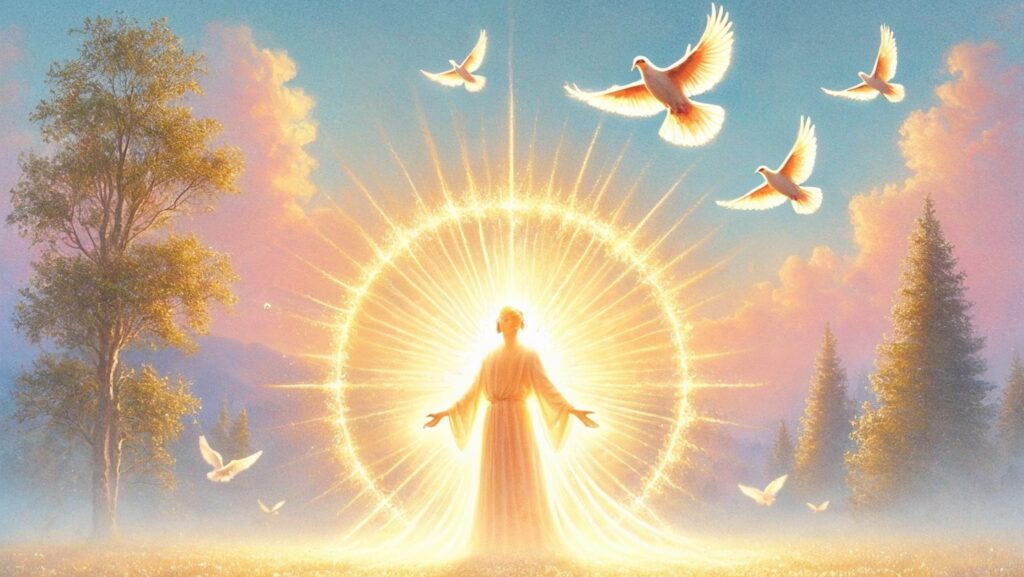In the hustle and bustle of life, where stress and uncertainty often cloud our vision, the simplicity of God’s Word stands as a breath of fresh air. The Apostle Paul, in his letter to the Corinthians, offers a timeless reminder: “And now these three remain: faith, hope, and love. But the greatest of these is love” (1 Corinthians 13:13). These words are not just poetic; they are profoundly practical. They cut through the noise of religious complexity and bring us back to the heart of what it means to live a life that honours God.
1 Corinthians 13:13 King James Version
And now abideth faith, hope, charity, these three; but the greatest of these is charity.
But let’s be honest—sometimes religion feels anything but simple. Rules, rituals, and debates can make faith seem like a maze rather than a path. And yet, Paul’s words remind us that at its core, Christianity is not about how much we know or how perfectly we perform; it’s about how deeply we love.
The Beauty of Simplicity in Faith
Have you ever felt overwhelmed by religion? Maybe you’ve wondered if you’re doing enough—praying enough, giving enough, serving enough. It’s easy to fall into this trap because human nature often equates complexity with value. We think that if something is difficult to understand or achieve, it must be more meaningful. But God’s kingdom operates differently.
Paul’s emphasis on faith, hope, and love reminds us that the Gospel is beautifully simple. Faith connects us to God’s grace. Hope anchors us in His promises. And love? Love reflects His very nature. As 1 John 4:8 says, “Whoever does not love does not know God, because God is love.”
When we strip away the layers of human-made rules and traditions, we find that faith is not about perfection but connection—connection with a God who loves us unconditionally and calls us to share that love with others.
Faith That Grounds Us
Faith is more than belief; it is trust in action. It’s what allows us to step forward even when the path ahead is unclear. Think about Abraham, who left everything familiar because he trusted God’s promise (Genesis 12:1-4). His faith wasn’t perfect—he doubted and stumbled along the way—but it was real.
In our own lives, faith might look like trusting God with our finances when money is tight or believing He has a purpose for our pain when life feels unbearable. It’s not about having all the answers; it’s about believing in the One who does.
But here’s the thing: faith without love can become rigid and cold. It can turn into legalism—a checklist of rules rather than a relationship with God. That’s why Paul reminds us that love is greater than faith. Love breathes life into our trust in God and makes it tangible to those around us.
Hope That Sustains Us
Hope is often misunderstood as wishful thinking, but biblical hope is much deeper. It is confident expectation rooted in God’s character and promises. Hope says, “I don’t see it yet, but I know it’s coming because God is faithful.”
This kind of hope sustains us through life’s hardest seasons. When grief threatens to overwhelm us or anxiety keeps us awake at night, hope whispers that this isn’t the end of the story. As Lamentations 3:22-23 reminds us, “Because of the Lord’s great love we are not consumed, for His compassions never fail. They are new every morning; great is Your faithfulness.”
Yet even hope can feel hollow if it isn’t paired with love. Hope without love can make us so focused on the future that we neglect the present—the people right in front of us who need compassion and kindness today. Love grounds our hope in reality and makes it actionable.
The Greatest of These Is Love
Why does Paul call love “the greatest”? Because while faith and hope are essential for this life, love is eternal. One day, when we stand face-to-face with God, we won’t need faith to believe or hope to wait—we will see Him as He is (1 John 3:2). But love will remain because love is the very essence of who God is and what heaven will be like.
Love also has the power to simplify what religion often complicates. Jesus Himself said that all the law and prophets hang on two commandments: “Love the Lord your God with all your heart and with all your soul and with all your mind” and “Love your neighbour as yourself” (Matthew 22:37-40). When we focus on loving God and others, everything else falls into place.
When Religion Becomes a Burden
For many people, religion feels more like a burden than a blessing. Maybe you’ve experienced this yourself—feeling judged for not measuring up or confused by conflicting interpretations of Scripture. Even Jesus encountered this problem during His ministry. The Pharisees were so focused on rules that they missed the heart of God’s law: mercy and justice (Matthew 23:23).
Jesus offered an alternative: “Come to me, all you who are weary and burdened, and I will give you rest” (Matthew 11:28). His invitation wasn’t to follow more rules but to enter into a relationship—a relationship defined by grace, not guilt; by love, not legalism.
If religion has ever felt complicated or exhausting for you, take heart in knowing that Jesus came to simplify what humans have made complex. His message is clear: Love God. Love others. Everything else flows from there.
Living Out Faith, Hope, and Love
So how do we live out these three virtues in our daily lives? Here are some practical ways:
- Start with Prayer: Ask God to help you see where you’ve overcomplicated your faith or lost sight of what truly matters.
- Focus on Relationships: Prioritize loving people over proving points or winning arguments.
- Practice Gratitude: Cultivate hope by reflecting on God’s past faithfulness as you wait for His future promises.
- Be Patient with Yourself: Growth takes time, and God’s grace covers your imperfections.
- Serve Others: Let your faith come alive through acts of kindness and generosity.
Read More About This Devotional
Words of Wisdom: Love: The Heartbeat of Faith and Life
Quote of the Day: “The fulfilment of God’s blessing in your life will also bless others”
A Final Encouragement
Paul’s words in 1 Corinthians 13:13 are both comforting and challenging because they call us back to what really matters—faith that trusts God completely, hope that endures through trials, and love that reflects His heart to a hurting world.
In a world full of distractions and divisions—even within Christianity—let us remember that religion doesn’t have to complicate our walk with God. When we keep our eyes on Jesus and let His love flow through us, we find that faith becomes simpler, hope becomes stronger, and life becomes richer.
Scripture Reading for the Day
Genesis 22 King James Version
1And it came to pass after these things, that God did tempt Abraham, and said unto him, Abraham: and he said, Behold, here I am.
2 And he said, Take now thy son, thine only son Isaac, whom thou lovest, and get thee into the land of Moriah; and offer him there for a burnt offering upon one of the mountains which I will tell thee of.
3 And Abraham rose up early in the morning, and saddled his ass, and took two of his young men with him, and Isaac his son, and clave the wood for the burnt offering, and rose up, and went unto the place of which God had told him.
4 Then on the third day Abraham lifted up his eyes, and saw the place afar off.
5 And Abraham said unto his young men, Abide ye here with the ass; and I and the lad will go yonder and worship, and come again to you.
6 And Abraham took the wood of the burnt offering, and laid it upon Isaac his son; and he took the fire in his hand, and a knife; and they went both of them together.
7 And Isaac spake unto Abraham his father, and said, My father: and he said, Here am I, my son. And he said, Behold the fire and the wood: but where is the lamb for a burnt offering?
8 And Abraham said, My son, God will provide himself a lamb for a burnt offering: so they went both of them together.
9 And they came to the place which God had told him of; and Abraham built an altar there, and laid the wood in order, and bound Isaac his son, and laid him on the altar upon the wood.
10 And Abraham stretched forth his hand, and took the knife to slay his son.
11 And the angel of the Lord called unto him out of heaven, and said, Abraham, Abraham: and he said, Here am I.
12 And he said, Lay not thine hand upon the lad, neither do thou any thing unto him: for now I know that thou fearest God, seeing thou hast not withheld thy son, thine only son from me.
13 And Abraham lifted up his eyes, and looked, and behold behind him a ram caught in a thicket by his horns: and Abraham went and took the ram, and offered him up for a burnt offering in the stead of his son.
14 And Abraham called the name of that place Jehovahjireh: as it is said to this day, In the mount of the Lord it shall be seen.
15 And the angel of the Lord called unto Abraham out of heaven the second time,
16 And said, By myself have I sworn, saith the Lord, for because thou hast done this thing, and hast not withheld thy son, thine only son:
17 That in blessing I will bless thee, and in multiplying I will multiply thy seed as the stars of the heaven, and as the sand which is upon the sea shore; and thy seed shall possess the gate of his enemies;
18 And in thy seed shall all the nations of the earth be blessed; because thou hast obeyed my voice.
19 So Abraham returned unto his young men, and they rose up and went together to Beersheba; and Abraham dwelt at Beersheba.
20 And it came to pass after these things, that it was told Abraham, saying, Behold, Milcah, she hath also born children unto thy brother Nahor;
21 Huz his firstborn, and Buz his brother, and Kemuel the father of Aram,
22 And Chesed, and Hazo, and Pildash, and Jidlaph, and Bethuel.
23 And Bethuel begat Rebekah: these eight Milcah did bear to Nahor, Abraham’s brother.
24 And his concubine, whose name was Reumah, she bare also Tebah, and Gaham, and Thahash, and Maachah.



